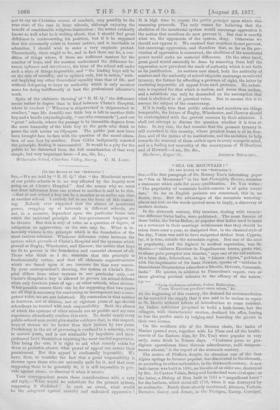[TO THE EDITOR OF THE °SPECTATOR:]
Siu,—We are told by " It H. Q." that " the Monitorial system of our public schools is in no way affected by the inquiry now going on at Christ's Hospital." And the reason why we must not draw inferences from one system to another is said to be this, —that at one school a boy can be a monitor at an earlier age than at another school. I entirely fail to see the force of this reason- ing. Nobody ever supposed that the abuses of monitorial power, cropping up at intervals in different schools, are not, in a measure, dependent upon the particular forms into which the universal principle of boy-government happens to be thrown. But this is only of value as a question of degree, of mitigation or aggravation, as the case may be. What is in- herently vicious is the principle which is the foundation of the most various schemes, Whatever difference exists between the system which prevails at Christ's Hospital and the systems which prevail at Rugby, Winchester, and Harrow, the notion that boys are fit to govern is the foundation and essential element of all. Those who think as I do, maintain that this principle is fundamentally rotten, and that all elaborate superstructures which are based upon it are insecure for that very reason. By your correspondent's showing, the system at Christ's Hos- pital differs from other systems in one particular only,—at Christ's Hospital a boy is allowed to govern his school-fellows when only fourteen years of age ; at other schools, when sixteen. What possible reason there can be for supposing that two years are all that is necessary for converting an incompetent into a com- petent ruler, we are not informed. My contention is that neither at fourteen, nor at sixteen, nor at eighteen years of age should schoolboys be trusted with such responsibility. Both the abuses of which the systems of other schools are so prolific and my own experience abundantly confirm this view. No doubt nearly every public-school man could give similar evidence that, in this respect, boys of sixteen are no better than their juniors by two years. Proficiency in the art of governing is confined to a minority, even in mature years, and is not attainable by impulsive and inex- perienced boys, themselves requiring the most careful supervision. This being the case, it is right to ask what remedy exists for these so probable abuses, what power of appeal can ensure 'their punishment. But this appeal is confessedly impossible. We have, then, to consider the fact that a great responsibility is thrown upon those who are naturally unfit for it, and that even supposing them to be generally fit, it is still impossible to pro- vide against abuse, or discover it when it occurs.
Your correspondent meets these considerations with a very old reply,—What would we substitute for the present system, supposing it abolished ? In such an event, what would be the safeguard against anarchy and unlimited oppression ?
It is high time to expose the petitio principii upon which this reasoning proceeds. The only reason for believing that the abolition of the monitorial system would encourage oppression is the notion that monitors do now prevent it. But that is exactly what we, the opponents of the system, deny. Otherwise we should not oppose it. We contend that monitors do not prevent, but encourage oppression, and therefore that, so far as the pre- vention of oppression is concerned, the abolition of the monitorial power would make no material difference. On the other hand, great good would assuredly be done by removing from half the oppression now prevalent the mask of authority which is set forth as its justification. As matters now stand, both the authority of masters and the authority of school etiquette encourage monitorial tyranny, the former by affording a pretence of right, the latter by rendering impossible all appeal from such pretence. No substis tute is required for that which is useless, and worse than useless, and a substitute can only be demanded on the assumption that what is abolished is of practical value. But to assume this is to assume the subject of the controversy.
if it is really true that public schools and monitors are things inseparable, the future of Rugby, Winchester, and Harrow should be contemplated with the gravest concern by their admirers. I shall not attempt to discuss the question whether it is true or false. In any case, the fact remains that the grossest tyranny is still exercised in this country, whose greatest boast is of its free- dom and of the justice of its institutions, and the ambition to help towards the removal of these evils is open to every energetic mind, and is a feeling not unworthy of the countrymen of Wilberforce and of Howard.-1 am, Sir, cgsc.,






























 Previous page
Previous page